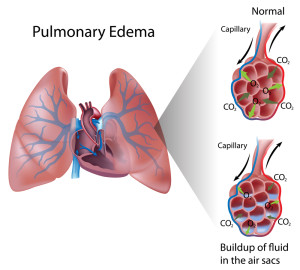Congestive heart failure (CHF) indicates that the heart has become larger and is failing as a pump. There can be several reasons for this.
Some of them are:
a) Generalized slow development of coronary artery disease. This can develop slower and more diffusely so that no overt heart attack will develop. Instead there is a diffuse slow death of many of the heart muscle fibers.
b) Leaky heart valves. This leads to a backwards flow and accumulation of fluid in the heart eventually widening and enlarging the heart (heart enlargement).
c) Myocarditis from toxins such as alcohol abuse or from viral infection, which both leads to diffuse damage of the heart muscle and CHF (congestive heart failure). It is also called cardiomyopathy.
Whatever the cause is, this leads to the cardiac failure symptoms, such as shortness of breath (from pulmonary edema), lack of energy, decreased alertness, fluid accumulation in the legs, chest pain.
The cardiologist needs to sort out what the cause is of CHF. Often it remains unknown, if there is a combination of factors. Before the ACE inhibitors CHF was as deadly as cancer with a 5 year survival of about 50%. Now on an ACE inhibitor the average survival is about 10 years or more. This may still be prolonged further with the use of low-dose aspirin as a February 2014 study showed: Patients on low-dose aspirin (75 mg per day) were 42% less likely to die and 30% less likely to be hospitalized for heart failure when compared to those who did not take aspirin.
In the case of heart valve problems porcine and other valve replacements by a cardiovascular surgeon have improved survival even more. Viral and alcoholic myocarditis have the worst prognosis and may require a heart transplant to replace the failing pump with a “new” pump.
People with end stage congestive heart failure who are awaiting a heart transplant can be put on a mechanical heart as discussed in this blog as an interim solution.
There is also a peculiar correlation between decreased bone density and congestive heart failure as is explained under this link.
References:
1. The Merck Manual, 7th edition, by M. H. Beers et al., Whitehouse Station, N.J., 1999. Chapters 197, 202, 205 and 207.
2. Braunwald: Heart Disease: A Textbook of Cardiovascular Medicine, 6th ed., 2001, W. B. Saunders Co.
3. D C Bauer: Audio-Digest Family Practice Vol. 49, Iss. 09, March 2, 2001.
4. Ferri: Ferri’s Clinical Advisor: Instant Diagnosis and Treatment, 2004 ed., Copyright © 2004 Mosby, Inc.
5. Rakel: Conn’s Current Therapy 2004, 56th ed., Copyright © 2004 Elsevier







